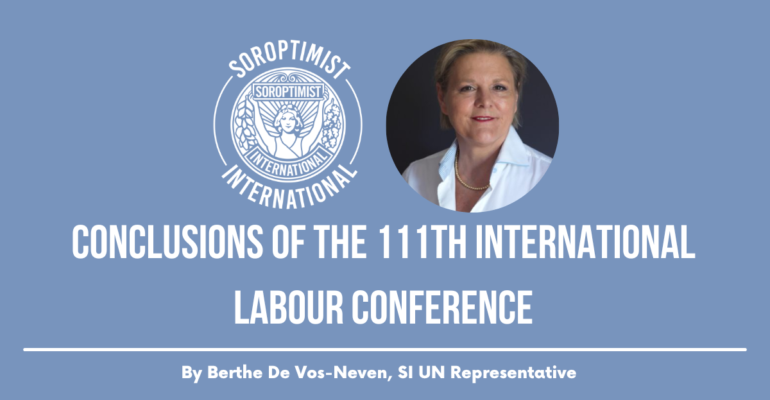This year in Geneva, from 5 to 16 June, the discussions of 111th session of the ILC were concentrated around “a just transition towards sustainable and inclusive economies, quality apprenticeships, and labour protection”. The Convention was attended by approximately 5,000 delegates representing governments, workers and employers from the 187 Member States as well as Civil Society.

Major decisions included the adapted conclusions, which aims for a new labour standard “opportunities for people of all ages to skill, reskill and upskill continuously”, a final definition and new norms for an apprenticeship, including rights and protection. Furthermore, the decisions of the Member States opened the way forward towards more inclusive and effective labour protection for all workers and creates a basis for the creation of an action plan.
The members of the Committee of the 111th session of the ILC underlined the urgent need to ratify the following Conventions by Member States:
- The elimination of all forms of discrimination in employment and occupation (C190),
- The guarantee of full and effective maternity protection (C183),
- The right of workers with family responsibilities to engage in employment (C156).
The good news was that 13 Member States have ratified different conventions during the 111th session. Four countries adopted the convention against violence and harassment in the world of work (C190), which brings the total number of those who have ratified this convention to 31! Two countries also finally adapted the conventions concerning occupational and safety and health (C155); a total of 78 Member States out of 187!
Also, the Member States approved the report of the Committee on the Application of Standards, which is an important body of the ILO, who examine individual country cases related to the observance of ILO Conventions. The process is only possible after a ratification of a convention.
Between June 14 and 15, the World of Summit, “Social Justice for All”, took place. A wide range of social justice issues (e.g. the proposal for a Global Coalition for Social Justice) were discussed. Furthermore, fierce discussions ensued on inequalities and informality, creating equal opportunities, lifelong learning and skills development, social protection, sustainable development, and human and labour rights, … to mention only a few.
In addition, as June 16th is the International Domestic Workers Day, the Member States urged the need to once more discuss the topic: “Is domestic work care work?”, “Why is the role of domestic workers still underappreciated?”, and also “How can their contribution to the care economy can be properly recognised?”
In 2011 the first international labour standard that recognised domestic work as equivalent to all other kinds of work (C189) was agreed (Note: until today only 76 Member States have ratified C189). In many countries “domestic workers” still fall under the group of household tasks, which means that they can’t enjoy the protection of C 189.
As many Member States are struggling with a shortage of care workers in their countries, the discussion mainly focused on the rectification of the conditions, pay and status of these workers, as the current “domestic workers” are mostly excluded from this classification and it’s associated protections.
During the last day the need to advance a just transition to achieve social justice, eradicate poverty, and support decent work were fully agreed in the conclusions of the General Discussions. Moreover, the delegates endorsed the ILO Guidelines for a just transition towards environmentally sustainable economies and societies as a basis for an action plan and the central reference for policymaking.

Director-General Houngbo emphasis in his speech on the achievements of the delegates:
“You should be proud of what you have accomplished… Your commitment to the mandate of the ILO, your skilled negotiations, your careful diplomacy, resulted in the adoption of several significant documents at this Conference. As we continue the ILO’s long journey to fulfil its mandate, we heard resounding and unequivocal support for a Global Coalition for Social Justice. Heads of State, Ministers of Labor and leaders of employers’ and workers’ organisations recognised the Global Coalition as an initiative that is timely and essential. We must now build on this momentum.”
Finally, there is still a lot of work to be done, but we can conclude that the “will” to move forward towards a fair labour market without discrimination will be possible!
To learn more about the 111th session of the ILC, visit the International Labour Organisation’s webpage on the event.


Thanks for sharing such detailed information.